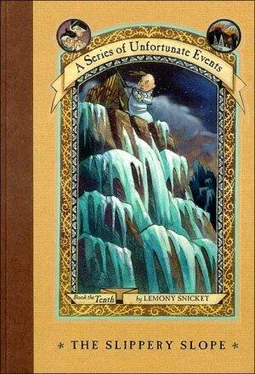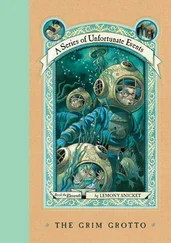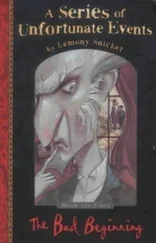Lemony Snicket - The Slippery Slope
Здесь есть возможность читать онлайн «Lemony Snicket - The Slippery Slope» весь текст электронной книги совершенно бесплатно (целиком полную версию без сокращений). В некоторых случаях можно слушать аудио, скачать через торрент в формате fb2 и присутствует краткое содержание. Год выпуска: 2003, Жанр: Прочие приключения, на английском языке. Описание произведения, (предисловие) а так же отзывы посетителей доступны на портале библиотеки ЛибКат.
- Название:The Slippery Slope
- Автор:
- Жанр:
- Год:2003
- ISBN:нет данных
- Рейтинг книги:5 / 5. Голосов: 1
-
Избранное:Добавить в избранное
- Отзывы:
-
Ваша оценка:
- 100
- 1
- 2
- 3
- 4
- 5
The Slippery Slope: краткое содержание, описание и аннотация
Предлагаем к чтению аннотацию, описание, краткое содержание или предисловие (зависит от того, что написал сам автор книги «The Slippery Slope»). Если вы не нашли необходимую информацию о книге — напишите в комментариях, мы постараемся отыскать её.
The Slippery Slope — читать онлайн бесплатно полную книгу (весь текст) целиком
Ниже представлен текст книги, разбитый по страницам. Система сохранения места последней прочитанной страницы, позволяет с удобством читать онлайн бесплатно книгу «The Slippery Slope», без необходимости каждый раз заново искать на чём Вы остановились. Поставьте закладку, и сможете в любой момент перейти на страницу, на которой закончили чтение.
Интервал:
Закладка:
"J.S.," Quigley said. "Jacques Snicket."
"The message can't be for Jacques Snicket " Violet said. "He's dead."
"Maybe whoever wrote this message doesn't know that," Klaus said, and continued to read from the commonplace book. '"If necessary, the dialogue uses a cured, fruit-based calendar for days of the week in order to announce a gathering. Sunday is represented by a lone — ' Here it's cut off again, but I think that means that these olives are an encoded way of communicating which day of the week a gathering will take place, with Sunday being one olive, Monday being two, and so on."
"How many olives are in that container?" Quigley asked.
"Five," Klaus said, wrinkling his nose. "I didn't like counting them. Ever since the Squalors fixed us aqueous martinis, the taste of olives hasn't really appealed to me."
"Five olives means Thursday," Violet said.
"Today's Friday," Quigley said. "The gathering of the volunteers is less than a week away.
The two Baudelaires nodded in agreement, and Klaus opened his notebook again. '"Any spice-based condiment,'" he read, "'should have a coded label referring volunteers to encoded poems.'"
"I don't think I understand," Quigley said.
Klaus sighed, and reached for the jar of mustard. "This is where it really gets complicated. Mustard is a spice-based condiment, and according to the code, it should refer us to a poem of some sort."
"How can mustard refer us to a poem?" Violet asked.
Klaus smiled. "I was puzzled for a long time," he said, "but I finally thought to look at the list of ingredients. Listen to this: 'Vinegar, mustard seed, salt, tumeric, the final quatrain of the eleventh stanza of "The Garden of Proserpine," by Algernon Charles Swinburne, and calcium disodium, an allegedly natural preservative.' A quatrain is four lines of a poem, and a stanza is another word for a verse. They hid a reference to a poem in the list of ingredients."
"It's the perfect place to hide something," Violet said. "No one ever reads those lists very carefully. But did you find the poem?"
Klaus frowned, and lifted the teacup. "Under a burnt wooden sign marked 'Poetry,' I found a pile of papers that were burned practically beyond recognition," he said, "but here's the one surviving scrap, and it's the last quatrain of the eleventh stanza of 'The Garden of Proserpine,' by Algernon Charles Swinburne."
"That's convenient," Quigley said.
"A little too convenient," Klaus said. "The entire library was destroyed, and the one poem that survived is the one we need. It can't be a coincidence." He held out the scrap of paper so Violet and Quigley could see it. "It's as if someone knew we'd be looking for this."
"What does the quatrain say?" Violet asked.
"It's not very cheerful," Klaus said, and tilted the flashlight so he could read it:
"That no life lives forever; That dead men rise up never; That even the weariest river Winds somewhere safe to sea. "
The children shivered, and moved so they were sitting even closer together on the ground. It had grown darker, and Klaus's flashlight was pratically the only thing they could see. If you have ever found yourself sitting in darkness with a flashlight, you may have experienced the feeling that something is lurking just beyond the circle of light that a flashlight makes, and reading a poem about dead men is not a good way to make yourself feel better.
"I wish Isadora were here," Quigley said. "She could tell us what that poem means."
"Even the weariest river winds somewhere safe to sea," Violet repeated. "Do you think that refers to the last safe place?"
"I don't know," Klaus said. "I couldn't find anything else that would help us."
"What about the lemon juice?" Violet asked. "And the pickle?"
Klaus shook his head, although his sister could scarcely see him in the dark. "There might be more to the message," he said, "but it's all gone up in smoke. I couldn't find anything more in the library that seemed helpful."
Violet took the scrap of paper from her brother and looked at the quatrain. "There's something very faint here," she said. "Something written in pencil, but it's too faint to read."
Quigley reached into his backpack. "I forgot we have two flashlights," he said, and shone a second light onto the paper. Sure enough, there was one word, written very faintly in pencil beside the last four lines of the poem's eleventh stanza. Violet, Klaus, and Quigley leaned in as far as they could to see what it was. The night winds rustled the fragile paper, and made the children shiver, shaking the flashlights, but at last the light shone on the quatrain and they could see what words were there.
"Sugar bowl," they said in unison, and looked at one another.
"What could that mean?" Klaus asked.
Violet sighed. "When we were hiding underneath the car," she said to Quigley, "one of those villains said something about searching for a sugar bowl, remember?"
Quigley nodded, and took out his purple notebook. "Jacques Snicket mentioned a sugar bowl once," he said, "when we were in Dr. Montgomery's library. He said it was very important to find it. I wrote it down on the top of a page in my commonplace book, so I could add any information I learned about its whereabouts." He held up the page so the two Baudelaires could see that it was blank. "I never learned anything more," he said.
Klaus sighed. "It seems that the more we learn, the more mysteries we find. We reached V.F.D. headquarters and decoded a message, and all we know is that there's one last safe place, and volunteers are gathering there on Thursday."
"That might be enough," Violet said, "if Sunny finds out where the safe place is."
"But how are we going to get Sunny away from Count Olaf?" Klaus asked.
"With your fork-assisted climbing shoes," Quigley said. "We can climb up there again, and sneak away with Sunny."
Violet shook her head. "The moment they noticed Sunny was gone," she said, "they would find us. From Mount Fraught, they can see everything and everyone for miles and miles, and we're hopelessly outnumbered."
"That's true," Quigley admitted. "There are ten villains up there, and only four of us. Then how are we going to rescue her?"
"Olaf has someone we love," Klaus said thoughtfully. "If we had something he loves, we could trade it for Sunny's return. What does Count Olaf love?"
"Money," Violet said.
"Fire," Quigley said.
"We don't have any money," Klaus said, "and Olaf won't trade Sunny for a fire. There must be something he really loves — something that makes him happy, and would make him very unhappy if it were taken away."
Violet and Quigley looked at one another and smiled. "Count Olaf loves Esmé Squalor," Violet said. "If we were holding Esmé prisoner, we could arrange a trade."
"That's true," Klaus said, "but we're not holding Esmé prisoner."
"We could take her prisoner," Quigley said, and everyone was quiet. Taking someone prisoner, of course, is a villainous thing to do, and when you think of doing a villainous thing — even if you have a very good reason for thinking of doing it — it can make you feel like a villain, too. Lately, the Baudelaires had been doing things like wearing disguises and helping burn down a carnival, and were beginning to feel more and more like villains themselves. But Violet and Klaus had never done anything as villainous as taking somebody prisoner, and as they looked at Quigley they could tell that he felt just as uncomfortable, sitting in the dark and thinking up a villainous plan.
"How would we do it?" Klaus asked quietly.
"We could lure her to us," Violet said, "and trap her."
Quigley wrote something down in his commonplace book. "We could use the Verdant Flammable Devices," he said. "Esmé thinks they're cigarettes, and she thinks cigarettes are in. If we lit some of them, she might smell the smoke and come down here."
Читать дальшеИнтервал:
Закладка:
Похожие книги на «The Slippery Slope»
Представляем Вашему вниманию похожие книги на «The Slippery Slope» списком для выбора. Мы отобрали схожую по названию и смыслу литературу в надежде предоставить читателям больше вариантов отыскать новые, интересные, ещё непрочитанные произведения.
Обсуждение, отзывы о книге «The Slippery Slope» и просто собственные мнения читателей. Оставьте ваши комментарии, напишите, что Вы думаете о произведении, его смысле или главных героях. Укажите что конкретно понравилось, а что нет, и почему Вы так считаете.












